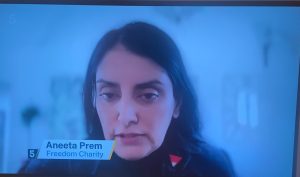
Raneem’s Law UK response: Will It Protect Victims?
I appeared on Channel 5 News on 21 January to discuss Raneem’s Law UK response. This law places domestic abuse specialists in 999 control rooms, aiming to protect victims by ensuring fast and effective police responses.
While this is a positive step, key concerns remain. What happens if multiple high-risk calls come in at the same time? Will there be enough trained officers to respond? Without proper training, funding, and enforcement, victims may still be ignored when they need help most.
Why Raneem’s Law Domestic Abuse Response UK Matters
Domestic abuse remains a national emergency in the UK.
- Nearly 100 domestic abuse-related crimes are recorded every hour.
- Victims try to leave their abuser an average of seven times before they succeed.
- Many 999 calls never happen because victims fear the consequences.
Raneem Oudeh’s case is a tragic example. She called 999 four times, yet police failed to take action. Hours later, she and her mother were murdered.
This law must prevent another tragedy like Raneem’s.
How Raneem’s Law UK Response Will Change 999 Calls
The law introduces specialist domestic abuse officers into 999 control rooms. Their job is to:
- Assess risk in real time to prioritise high-risk cases.
- Ensure fast police responses when a victim is in danger.
- Recognise coercive control and dishonour-based abuse, which are often overlooked.
A pilot scheme is already running in five police forces: West Midlands, Northumbria, Northamptonshire, Bedfordshire, and Humberside. If successful, the law will expand to all UK police forces.
But will there be enough trained officers to handle multiple crisis calls at the same time?
Are There Enough Trained Officers for Raneem’s Law? Raneem’s Law UK response
For Raneem’s Law Domestic Abuse Response UK to succeed, there must be enough trained officers to handle cases.
Current statistics:
- 60% of police officers have received some domestic abuse training.
- Only 84 Domestic Abuse Matters Champions exist across the UK.
- The Met Police trained 7,500 officers in domestic abuse response last year.
- 77% of Met officers have completed Signa training.
While this progress is welcome, it is not enough. If multiple victims call 999 at the same time, will there be enough trained officers to respond immediately?
Without proper recruitment and funding, victims will still be left waiting—or worse, ignored.
Raneem’s Law Strengthens Domestic Abuse Protection Orders
This law introduces Domestic Abuse Protection Orders (DAPOs), offering better legal protection for victims.
Key Changes in DAPOs
- No expiration date – Unlike current orders, which expire after 28 days.
- Electronic tagging – Police can track abusers to prevent them from breaching the order.
- Stronger penalties – Breaching a DAPO is now a criminal offence, punishable by up to five years in prison.
For these measures to work, the system must:
- Act immediately when a DAPO is breached.
- Ensure courts prioritise domestic abuse cases to prevent delays.
- Provide ongoing victim support beyond just issuing a legal order.
Without strict enforcement, Raneem’s Law will fail to stop repeat offenders.
Education is Essential to Prevent Domestic Abuse
Laws alone cannot stop domestic abuse. Prevention is just as important as enforcement.
At Freedom Charity, we run the “Not In My Name” campaign, which:
- Teaches young people about coercion, control, and abuse.
- Challenges harmful ideas that normalise violence.
- Encourages boys and men to take responsibility in ending domestic abuse.
Laws like Raneem’s Law Domestic Abuse Response UK must be backed by education so victims recognise abuse earlier and seek help sooner.
What Needs to Happen Next?
To ensure Raneem’s Law Domestic Abuse Response UK protects victims, we need:
- More trained police officers to handle high-risk calls.
- Sufficient long-term funding to support domestic abuse specialists.
- Strict enforcement of DAPOs to keep victims safe.
- Expanded education campaigns to help prevent domestic abuse.
Without these steps, this law risks being another policy that fails victims.
Will Raneem’s Law Protect Victims – or Fail Like Previous Policies?
We must hold police forces, policymakers, and the government accountable to ensure:
- Every domestic abuse call is treated as an emergency.
- Police officers have the right training and resources.
- Victims receive the protection they deserve.
This law could transform how the UK responds to domestic abuse, but unless it is fully funded and enforced, it will fail victims again.
At Freedom Charity, we will keep fighting for those who need us most. the question is will Raneem’s Law UK response be enough?
I raised these concerns on Channel 5 News on 21 January because this law must not fail.
Take Action
support Freedom charity
#RaneemsLaw #DomesticAbuseResponse #FreedomCharity #SupportSurvivors #EndAbuse #HumanRights #NotInMyName #EducationForChange #StrongerLaws #DomesticViolencePrevention

